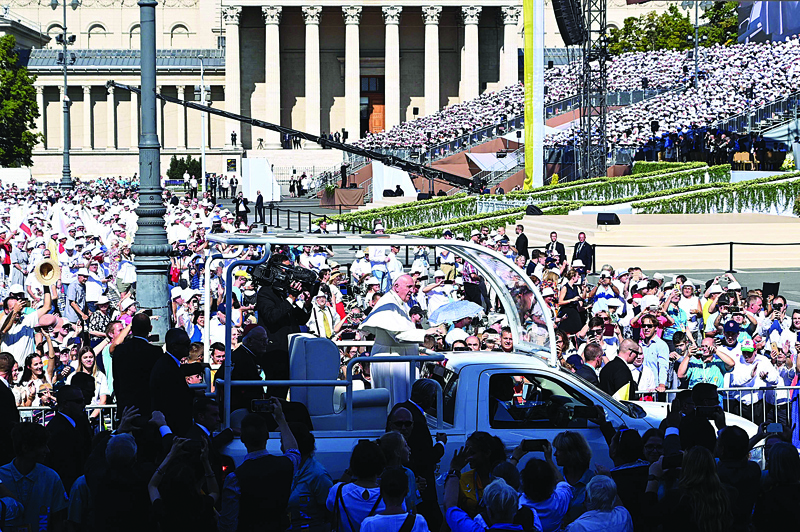 BUDAPEST: Pope Francis greets faithful as he arrives in an open vehicle for a Holy Mass at the end of an International Eucharistic Congress in Budapest yesterday during his papal visit to Hungary. - AFP
BUDAPEST: Pope Francis greets faithful as he arrives in an open vehicle for a Holy Mass at the end of an International Eucharistic Congress in Budapest yesterday during his papal visit to Hungary. - AFP
BUDAPEST: Pope Francis met yesterday with Hungarian premier Viktor Orban-whose tough views on migration clash with those of the pontiff-at the start of a brief visit to Budapest where he will also celebrate a mass. The head of 1.3 billion Catholics-in Hungary to close the International Eucharistic Congress-met Orban, accompanied by his deputy and the president, behind closed doors in Budapest's grand Fine Arts Museum.
On the one hand, the Hungarian prime minister is a self-styled defender of "Christian Europe" from migration. On the other, Pope Francis urges help for the marginalized and those of all religions fleeing war and poverty. The pope's approach to meet those who don't share his worldview-eminently Christian according to the pontiff-has often been met with incomprehension among the faithful, particularly within the ranks of traditionalist Catholics. "I asked Pope Francis not to let Christian Hungary perish," Orban posted on his Facebook page following a photo of the two shaking hands. The Vatican in a statement after the meeting described it as "cordial".
"Among the various topics discussed were the role of the church in the country, the commitment to the protection of the environment, the protection and promotion of the family," the statement said. Over the last few years, there has been no love lost between Orban supporters in Hungary and the leader of the Catholic world. Pro-Orban media and political figures have launched barbs at the pontiff calling him "anti-Christian" for his pro-refugee sentiments, and the "Soros Pope", a reference to the Hungarian-born liberal US billionaire George Soros, a right-wing bete-noire.
'Work together'
Eyebrows have also been raised over the pontiff's whirlwind visit. His seven-hour-long stay in Hungary will be followed immediately by an official visit to smaller neighbor Slovakia of more than two days. In his first address during his visit-to Christian and Jewish leaders after meeting Orban as well as the country's bishops-Pope Francis warned of "the threat of antisemitism still lurking in Europe and elsewhere". "This is a fuse that must not be allowed to burn. And the best way to defuse it is to work together, positively, and to promote fraternity," the pontiff said seated. Hungary's 100,000-strong Jewish community is one the largest in Central Europe.
The 84-year-old pontiff's 34th foreign trip comes two months after a colon operation that required a general anaesthetic and a ten-day convalescence in hospital. "Sorry if I spoke sitting down. I'm not 15," the pope said. The Argentinean regularly reminds "old Europe" of its past, built on waves of new arrivals. In contrast, Orban's signature crusade against migration has included border fences and detention camps for asylum-seekers. Orban's supporters point instead to state-funded aid agency "Hungary Helps" which works to rebuild churches and schools in war-torn Syria, and sends doctors to Africa.
Orban's critics, however, accuse him of using Christianity as a shield to deflect criticism and a sword to attack opponents while targeting vulnerable minorities like migrants. Days before the pope's arrival posters appeared on the streets of the Hungarian capital-where the city council is controlled by the anti-Orban opposition-reading "Budapest welcomes the Holy Father" and showing his quotes including pleas for solidarity and tolerance towards minorities.
'Not here for politics'
Orban-who is of Calvinist Protestant background-and his wife-who is a Catholic- attended the Pope's mass later to close the 52nd International Eucharistic Congress at the vast Heroes' Square in Budapest. Around 75,000 people have registered to attend the event, with screens and loudspeakers placed the length of a main boulevard near the square to allow others to follow the ceremony. "We are not here for any politics, but to see and hear the pope, the head of the Church. We can hardly wait to see him. It is wonderful that he is visiting Budapest," Eva Mandoki, 82, from Eger, some 110 kilometers east of the capital said. It is the first papal trip to Hungary since Pope John Paul II in 1996. - AFP




